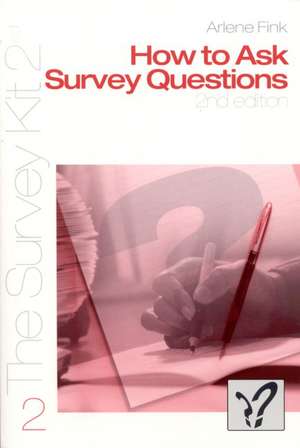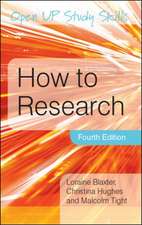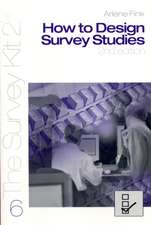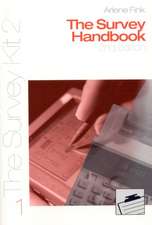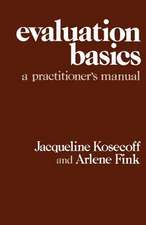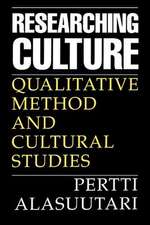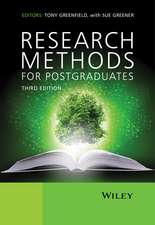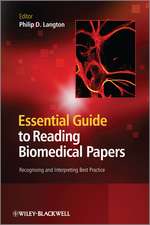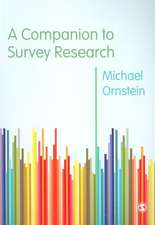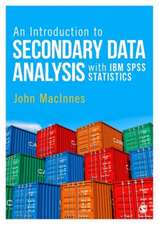How to Ask Survey Questions
Autor Arlene G. Finken Limba Engleză Paperback – 13 ian 2003
Preț: 548.90 lei
Preț vechi: 645.76 lei
-15% Nou
105.03€ • 110.25$ • 87.18£
Carte tipărită la comandă
Livrare economică 10-24 aprilie
Livrare express 06-12 martie pentru 36.25 lei
Specificații
ISBN-10: 0761925791
Pagini: 160
Ilustrații: Illustrations
Dimensiuni: 152 x 229 x 9 mm
Greutate: 0.23 kg
Ediția:Second Edition
Editura: SAGE Publications
Colecția Sage Publications, Inc
Locul publicării:Thousand Oaks, United States
Recenzii
Cuprins
Ch 1. Asking Questions: A Matter of Context
Checklist for Deciding the Survey's Context
Guidelines for Asking Survey Questions
Guidelines for Using Conventional Language When Asking Survey Questions
Ch 2. Keep Questions Closed or Open them Up?
Open-Ended Questions
Closed or Closed-Ended Questions
Checklist for Deciding Between Open- and Closed-Ended Questions
Ch 3. Responses: Choices and Measurement
Response Choices
Categorical or Nominal Measures: How to Get Them
Categorical Responses and Who Is Eligible
Categorical Responses Are Exclusive
Categorical Responses Are Inclusive
Categorical Responses and Meaning
Questions With Ordered Responses: How to Get Ordinal Data Using Common Rating Scales
Guidelines for Asking Closed Questions and Determining Ordered Responses or Scales
Numerical Measures
Ch 4. Knowledge, Attitudes, and Behavior: Additional Tips for Creating Survey Questions
Feelings and Intensity: Getting at the Attitude
Recall and Time: Getting at Behavior
Regulating Difficulty and Threat: Getting at Knowledge
Demographics: Who Are the Respondents?
Age, Income, and Education
Guidelines for Asking Questions on Vital Statistics and Demographics
Ch 5. Special Survey Questions: Factorial, Conjoint, and Online
Facturial Survey Questions: Constant or Changeable Beliefs?
Guidelines for Creating Factorial Survey Questions
Conjoint Analysis Questions: Which Do You Prefer?
Online Survey Questions
Dropdown Lists
Select One
Check All That Apply
Several Questions With the Same Response Choices
Open-Ended Questions
Ch 6. Survey Question Techniques for the Survey Team: The Focus Group
Focus Group Questions
Checklist for Conducting a Focus Group
Checklist for a Good Focus Group Question Sequence
Exercises
Answers
Suggested Readings
Glossary
About the Author
Notă biografică
Arlene Fink (PhD) is Professor of Medicine and Public Health at the University of California, Los Angeles, and president of the Langley Research Institute. Her main interests include evaluation and survey research and the conduct of research literature reviews as well as the evaluation of their quality. Dr. Fink has conducted scores of evaluation studies in public health, medicine, and education. She is on the faculty of UCLA¿s Robert Wood Johnson Clinical Scholars Program and is a scientific and evaluation advisor to UCLA¿s Gambling Studies and IMPACT (Improving Access, Counseling & Treatment for Californians with Prostate Cancer) programs. She consults nationally and internationally for agencies such as L¿institut de Promotion del la Prévention Secondaire en Addictologie (IPPSA) in Paris, France, and Peninsula Health in Victoria, Australia. Professor Fink has taught and lectured extensively all over the world and is the author of more than 130 peer-reviewed articles and 15 textbooks.
Descriere
--Bonnie Rader, California State University, Long Beach
Aimed at helping readers prepare and use reliable and valid survey questions, How to Ask Survey Questions, 2nd shows readers how to do the following:
* Ask valid and reliable questions for the context
* Determine whether to use open or closed questions
* Choose the right type of measurement (categorical, nominal or ordinal) for responses to survey questions
* Ask questions that get at attitude, behavior, and knowledge
* Develop factorial, conjoint and Internet survey questions
New to this edition is coverage of focus group questions, the characteristics and uses of factorial questions and conjoint analysis questions, and the principles underlying Internet survey questions.
